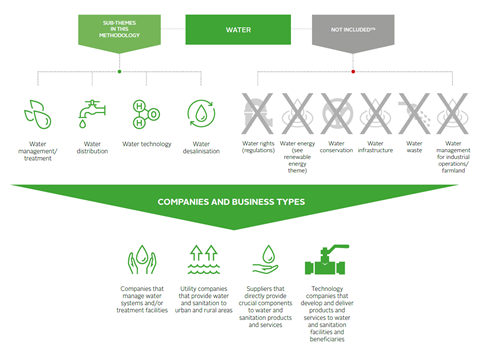
Water is considered a multi-impact investment because it affects the microclimate, food supply, industrial chain, health, productivity and the environment overall. A study by the World Health Organisation (WHO) found that the global economic return on sanitation spending is $5.5 per US dollar invested.
In this sense, water is intrinsically linked to other impact themes and has broad applicability to businesses and the investment community. Water management, water technologies, water distribution and water conservation are some of the areas that private and public organisations can operate in under this theme.
There is enormous pressure for investments in this theme, since 4.5 billion people lack safely managed sanitation services and 2.1 billion people lack access to safely managed drinking water services. Water-related hazards including floods, storms and droughts are responsible for 90% of natural disasters.
“The Market Map is a key resource for companies looking to understand how investors will assess their performance on ESG and impact criteria. As we march toward the achievement of the SDGs, the Market Map is a key step in aligning diverse stakeholders toward the same targets”.
Nick Ashburn, Senior Director, Impact Investing, Wharton Social Impact Initiative
Due to the complexity and diversification of the water theme, the Market Map focuses on businesses and companies operating in water and sanitation for human consumption exclusively.
In recent decades, international organisations have logged growing interest from public authorities to expand private investments in water and sanitation, driven by two factors. The first relates to public sector budget constraints making it more difficult to allocate capital into new investments or to increase existing investments in the water sector. Secondly, private operators have better access to knowledge in the field and dependency on public organisations for investments has waned.
Private companies may invest in and develop businesses in water consumption and sanitation in many ways, from transporting fresh water to impoverished communities in Sub-Saharan Africa to desalinating water in one of the Caribbean islands and operating water systems in large European and American cities.
According to World Bank data, most countries have specific regulations on water and sanitation companies, and not all countries adopt or follow basic conditions defined by the WHO for water quality. As such, most companies that have committed to providing fresh, safe and sustainable water and sanitation services adopt voluntary certifications to achieve their sustainable and responsible goals. But this is not the case across the entire industry, particularly in emerging markets and developing countries.

Private investors and companies may adopt practices that provide fresh water and access to water, but at a high cost to consumers and low income groups. Therefore, when assessing industries in this field, it is important to identify if companies comply with national and international principles beyond contractual agreements between the private and public sector.
Water companies may also differ in terms of how they are organised and funded, and how they operate – from those that are privately-owned, such as Bristol Water, to public-private partnership (PPP) companies in Portugal and publicly-owned companies in Latin America. It is therefore challenging to identify trends or the historical performance of water companies when they are aggregated.
There are, however, positive inputs from a variety of organisations interested in better defining and assessing impact companies in the water and sanitation sector. The UN has defined water and sanitation businesses; MSCI has designed a sustainable index that covers water and sanitation companies; and impact investing funds such as WHEB and Impax have developed methodologies and approaches to identify and measure impact investing companies in this field.
Definition: Water
Companies that produce or deliver products, projects and services with the scope to provide basic sanitation and safe and fresh water to humans without compromising the quality and sustainability of water resources. This includes water waste and water utilities, water infrastructure and water technology.
UN Human Right to Water and Sanitation and UN Human Rights Declaration
Download the full report
-

Impact investing market map
August 2018
Impact investing market map
- 1
- 2
- 3
- 4
- 5
- 6
- 7
- 8
 Currently reading
Currently readingWater
- 9
- 10
- 11
- 12



















